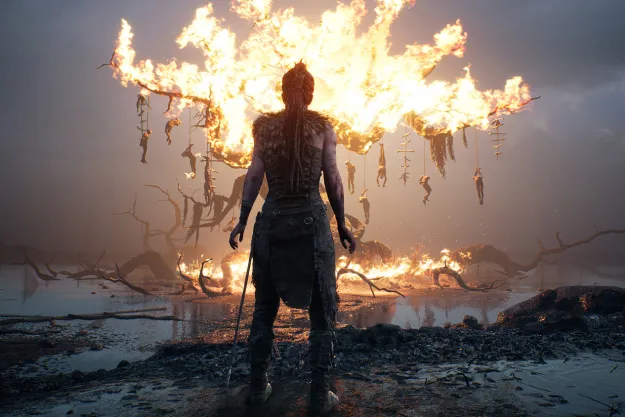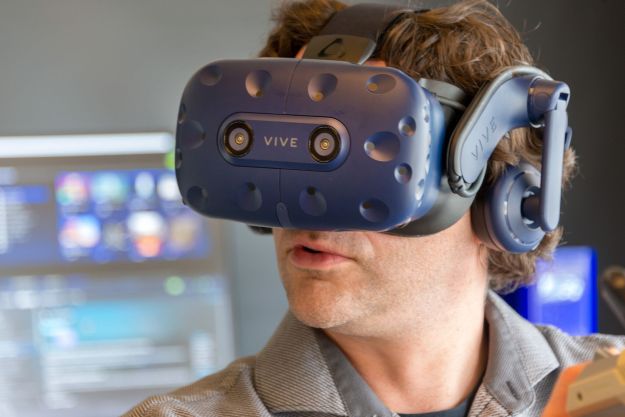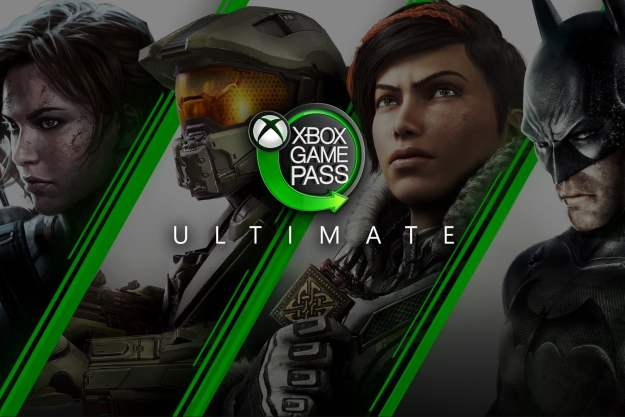
“Hellblade: Senua’s Sacrifice’s story of mental illness is unlike anything we’ve experienced before.”
- Dark and disturbing story
- Brilliant performances
- World-altering puzzles
- Gorgeous animation
- Obtuse design choices later on
- Combat gets repetitive
Video games frequently use mental illness as a mechanic, but developers rarely use games as a vehicle for exploring or commenting on the realities of mental health. Hellblade: Senua’s Sacrifice, a new game from Heavenly Sword developer Ninja Theory, tackles the confusing and abstract concept of psychosis in the best way it knows how — an intense action game. The result, as you’ll read in our Hellblade: Senua’s Sacrifice review, is designed to make you feel uncomfortable, by pushing you to question your own sanity.
The studio, which has made a string of cult classics, such as Enslaved: Odyssey to the West and Capcom’s most recent DmC: Devil May Cry, went the independent route with Hellblade. Ninja Theory takes some bold steps, creating a narrative-focused game that doesn’t shy away from complex subject matter. And while it features plenty of combat, it is not the game’s sole focus, which is a tectonic shift for this developer. While the game falters in spots, Hellblade is, above all else, a bold attempt to blend narrative and mechanics to tell an affective story in a way that only games can.
Welcome to Hel
Hellblade: Senua’s Sacrifice opens in the Norse underworld of Hel. Senua, a warrior who was sheltered from the outside world for much of her life and suffers from psychotic delusions, has ventured into the land of the dead to confront the goddess Hela in a deeply guarded realm known as Helheim. She aims to redeem the soul of her murdered lover, Dillion, hoping that her efforts may be enough to bring him back from the dead.
Everything Senua sees and hears seems real to her, but she’s aware that her world and reality are not completely aligned.
Before too long, however, that basic understanding of the story becomes unclear. Senua has nearly constant delusions and hallucinations, and create a world that cannot be trusted. Buildings and enemies change shape in an instant. Spectral creatures appear, offering both guidance and torment, and voices continually echo in Senua’s ear, questioning her actions (and yours) as she cuts through waves of gods and monsters that stand in her way. She also routinely sees visions of her dead mother, whose constant pain gradually eats away at Senua’s sanity even further.
Everything Senua sees and hears seems real to her, but she’s also aware that her world and reality are not completely aligned. She’ll routinely cry out in frustration, struggling to return to a more objective reality, while pining over the one she’s lost in, as it’s the only path toward reviving her love.
That struggle feels genuine thanks to a tremendous performance from the game’s lead performer, first-time actor Melina Juergens, who also worked on the project as a video editor. You wouldn’t think Juergens is new to performing without knowing that in advance, however – the pain on Senua’s face and her exasperated cries of frustration are intense, and they’re rendered in stunning detail.
Change the world
Despite the fact that Ninja Theory is known for fast, combo-centric combat, much of Hellblade focuses on exploring the various regions of Hel and finding your way forward through Senua’s ever-changing understanding of the world. Many of the game’s puzzles revolve around the idea that Senua’s perspective – her literal point-of-view in the game world – can cause broken bridges to rebuild themselves, blocked doorways to clear, and hallways to appear out of thin air.

Through our first few hours with the game, we thought we were “seeing things” just like Senua. At one point, we came across an area that appeared to need a bridge, with no clear way to get across. After returning to it about 10 minutes later, a bridge had appeared. We eventually discovered what triggered the change, but it took several more moments like this before we understood what had happened.
Every puzzle must be solved through exploration and experimentation alone, and this made for many of Hellblade’s most rewarding moments. Discovering how to get out of seemingly inescapable room feels tremendous in its own right, and these small victories also come with more narrative or context for Senua’s mental state.
Face your fears
Though it is not the game’s primary focus, Hellblade still features a decent amount of combat. Senua controls more like a character from Dark Souls than Dante from DmC, with fast and strong attacks, a parry, and a quick dodge to avoid larger enemies. Hellblade still shows flashes of Ninja Theory’s distinctive fighting, with lunging attacks and a “focus” ability which allows Senua to slow down time. When more enemies close in, you’re forced to quickly switch between them on the fly, which makes for a tough, but fair challenge.
The game uses its mechanics to show that mental illness can cause pain, but it isn’t a weakness.
Given the game’s narrative bent, Ninja Theory has taken great pains to link the game’s story and its gameplay. For example, the game’s “camera” is much too close to Senua for her to actually see enemies creeping behind her, but when an enemy sneaks up from behind, a voice in Senua’s head cries out, “behind you,” giving her just enough time to defend herself. Both in combat and out, the game uses its mechanics to show that mental illness can cause pain, but it isn’t a weakness.
Fighting monsters in Hellblade always feels intense, but becomes predictable once you understand its rules. Wait for an enemy to strike and parry them before striking back. If they have a shield, you have to break their guard first. If they have a larger two-handed weapon, you have dodge and get in close. Mechanical simplicity isn’t necessarily a problem — many Soulslikes use it to great effect — but it requires a wide array of enemy types to keep things interesting. Aside from a few bosses, you’ll be running into the same few enemies over and over again, and battles begin to lose some excitement as a result.
What should have been sacrificed.
Though Hellblade’s lack of hand-holding can feel refreshing for a game in 2017, the game can be obtuse to the point of frustration. The game is extremely linear, with a few escape sequences that require Senua to take a very specific path to avoid an untimely death. Make a wrong turn or even hesitate for more than a few seconds, and she’ll fall to the ground as flames engulf her body.
With each death, a dark “rot” crawls further up Senua’s arm. If it makes its way up to the top of her head, you’ll be forced to restart the game from the very beginning. The mechanic feels punishing: The cost of experimenting in puzzles or combat is extremely high, and could potentially prevent you from exploring the game. It certainly made the experience more tense, but it wasn’t always for the right reasons.
In many respects, Hellblade looks and sounds like a game from a full AAA studio, even though it was only made by about 20 people. However, there are certain areas of the game that feel especially unpolished. The game’s captions routinely differ from the game’s spoken dialogue, and are littered with typos. At the same time, the game’s voice audio occasionally loses sync with characters’ facial animations. Playing the game without subtitles minimizes some of these problems, but voice mixing is so low that it will be far too difficult to actually make out what characters are saying.
Our Take
Despite its rough edges, Hellblade is often stunning, and approaches mental illness with a unique blend of traditional storytelling and interactive mechanics. If you’re more interested in a stylish action game, there are certainly better options out there, but one thing is clear: No game will leave you feeling like Hellblade does.
Is there a better alternative?
No game tells a story anything like Hellblade. Other games have tried to broach the subject matter of mental illness, and even integrate on a mechanical level, but the game takes a unique approach to sharing those ideas.
If you’re looking for a story-intensive game with more and faster combat in the style of Ninja Theory’s past games, we recommend Square Enix’ Nier: Automata.
How long will it last?
The story will take about eight hours to complete, with some of that time devoted to figuring out puzzles.
Should you buy it?
Buy Hellblade: Senua’s Sacrifice if you’re looking for deeper meaning in your action games. Don’t buy it if you’re just looking for an excuse to cut baddies down to size.
Editors' Recommendations
- Senua’s Saga: Hellblade 2: release date, trailers, gameplay, and more
- Senua’s Saga: Hellblade 2’s new trailer is frighteningly immersive
- Cyberpunk 2077’s Phantom Liberty DLC not coming to last-gen consoles
- Ninja Theory’s Project: Mara is its latest game to tackle mental terror



